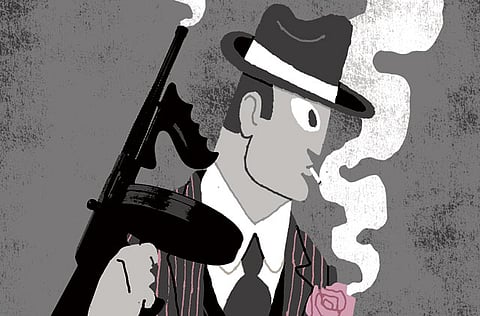A soft mobster with redeemable qualities
Yet another thriller from Dennis Lehane set in not-all-dark Boston underworld of the roaring Twenties

Live by Night
By Dennis Lehane,
William Morrow, 416 pages, $27.99
Whenever a book is adapted into a film, you can expect a deluge of comments on message boards and conversations of the “book was better” variety. Well, before the project gets announced and an IMDB page created for the “Live by Night” film, I’d like to get in early: It can only be better than the book. Or not.
You see, Dennis Lehane’s writing is deceptively simple. He sells you a boy-meets-girl story, but between that beginning, its boy-loses-girl development and the boy-is-driven-to-build-an-empire climax, he weaves in enough for a pretty decent crime romance thriller, or even a romantic crime thriller. Maybe even a historical drama or political thriller, with its backdrop of the strained United States-Cuban relations of the time.
The novel is set about a decade after Lehane’s historical novel “The Given Day”, which dealt with the 1919 Boston Police Strike and the birth of the Prohibition. In “Live By Night”, the Prohibition is firmly established, and so are those who seek to circumvent and — naturally — profit off it. Lehane’s Al Capone is Joe — never Joseph, his father’s name for him — Coughlin, a young man who at a younger age eschewed his working-class roots for the thrill of a life of crime, a life lived outside the law — a life lived at night, unbound by the laws of the day. His is a world of gangsters and underground — some literally — casinos and speakeasies, of (illegal) drinks and of (legal) cigars. But it is also a world of women.
This is the Roaring Twenties, and Joe and his men are the predators who roar the loudest. But note, our Joe, the protagonist, is an outlaw, never a gangster. And although the lines do blur at times, it is a distinction he clings to with fervour. Because he is also what is known in his circles as “soft” — “not a coward”, mind you, to quote one of the crime bosses higher up the ranks. A gentleman rouge, if you will. One who believes good deeds can follow bad money.
The story plays out in the Boston of two other Lehane works — the critically acclaimed “Mystic River” and “Gone Baby Gone”, both successful big-screen adaptations, and shares the dark tone Martin Scorcece tapped into for “Shutter Island”.
Lehane’s underworld isn’t all dark. He writes with a lyricism that is at times in stark contrast to his environment. He finds the subtle humour in unexpected circumstances and exploits the lighter moments to comic success and incorporates poetic flourishes which juxtapose the gangster lifestyle.
Lehane’s characters are very realistic — all flawed, all with characteristics the reader can identify with. While we might not agree with everything his characters do, they are well-rounded to warrant understanding of their actions. Yes, some of them might have “long ago amputated their conscience”, but even his saints aren’t saints and the most evil have redeeming qualities.
In a very modern way, Lehane’s women are strong enough to govern themselves. Most never distinguish themselves from the background, but two stand out: Emma and Graciela. As Joe mentions at the beginning of the book, almost everything of note that has happened in his life — good and bad — stems from his first meeting with Emma, during a heist, no less. Her shrewdness is highlighted when she re-enters his life to tell him: “I don’t want to be owned. I want to own.”
Graciela is no less smart, yet she Is Emma’s — and in a way Joe’s — antithesis. Irrevocably intertwined with the seedy business Joe has made his calling, she manages to simultaneously be removed from it, fighting as she is for her cause. Her strength comes through as an antidote to Joe’s cynicism; she manages to remain true to herself in a world where allegiances sway to money and power.
Lehane carries the burden of his success with him, yet he seems unhampered by it. His story unfolds unforced, at a languid pace, but is not without action. He opens “Live By Night” mid-action, with his hero’s life in danger, and the reader has to keep up. Then he turns back the dial to explore how Joe ended up on a boat with his feet in a bucket of cement, returns to that scene and then comes a denouement that might as well be written specifically for Hollywood.
So, which is better — the book or the would-be film? The book, hands down. But put Anthony Minghella at the helm of the film and cast Joseph Gordon-Levitt as Joe, and I might have to reconsider.
Sign up for the Daily Briefing
Get the latest news and updates straight to your inbox



